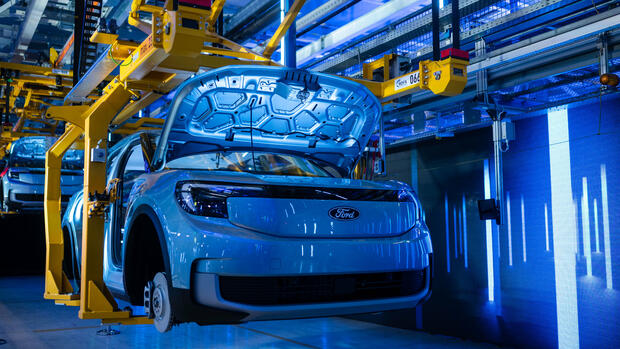According to the head of the association, Sigrid de Vries, there is a risk of considerable damage to the European economy.
(Photo: dpa)
Brussels The European car manufacturers are allied with the British government against the EU Commission. In a letter published on Tuesday and available to Handelsblatt, the Association of European Car Manufacturers (ACEA) is asking the Brussels authorities to postpone the new rules of origin for electric cars by three years.
The manufacturers are nervous because the rules should apply from January 2024. Then import duties of ten percent will be due on e-cars that do not come at least 45 percent of their value from the EU or Great Britain.
Import duties would be imposed on both sides of the English Channel. Since significantly more vehicles are exported from the EU to Great Britain than vice versa, this regulation primarily affects manufacturers from the car countries Germany, France, Italy and Spain.
“The potential damage to the European economy would be significant,” writes Acea boss Sigrid de Vries in the letter. The rules of origin are “unfulfillable”, the introduction in the short term “counterproductive”. The tariffs in the most important sales market for European manufacturers would reduce the sales figures for e-cars.
Industry estimates customs costs at 4.3 billion euros by 2026
The association surveyed ten EU companies, which account for 70 percent of e-car exports to Great Britain. According to their own estimates, European manufacturers would have to pay British import duties of 4.3 billion euros in the three years from 2024 to 2026. This would mean that around 480,000 fewer electric cars would be produced in the EU during this period.
The tariffs would be “an unnecessary burden for EU companies at a time of crucial upheaval in the industry,” writes de Vries. The British government has been calling for an extension of the deadline for a long time in order to avoid new burdens on its industry.
The rules after Brexit were agreed in the free trade agreement between Great Britain and the EU. During the transition period until the end of 2023, manufacturers should set up their own battery infrastructure in Europe.
Acea is now complaining that the deadline is too short to restructure the global battery supply chain. The energy crisis has also made it difficult to invest in domestic battery factories. Most batteries continue to come from China, which is why only a tenth of European e-car exports would currently meet the minimum quota of 45 percent of European origin.
EU Commission rejects deadline extension
The Commission heard the concerns at a meeting with industry representatives in early May and asked for more facts. As a result, the German automobile association VDA increased the pressure and warned of the consequences for the German automobile industry. Now comes the Acea.
The association emphasized that he did not fundamentally question the new rules of origin. They only want a temporary extension of the transition period.
In Brussels, it is now expected that the Commission will grant the extension.
Otherwise, from the point of view of the industry, there would only be one winner: China. De Vries points out that Chinese manufacturers’ share of the British electric car market rose from 2% to 32% between 2019 and 2022 – even though the Chinese already have to pay a 10% tariff. Should the European manufacturers now have to pay the same tariff, they would lose further market share, according to the association.
More: Brexit rules are becoming a competitive disadvantage for European car manufacturers
